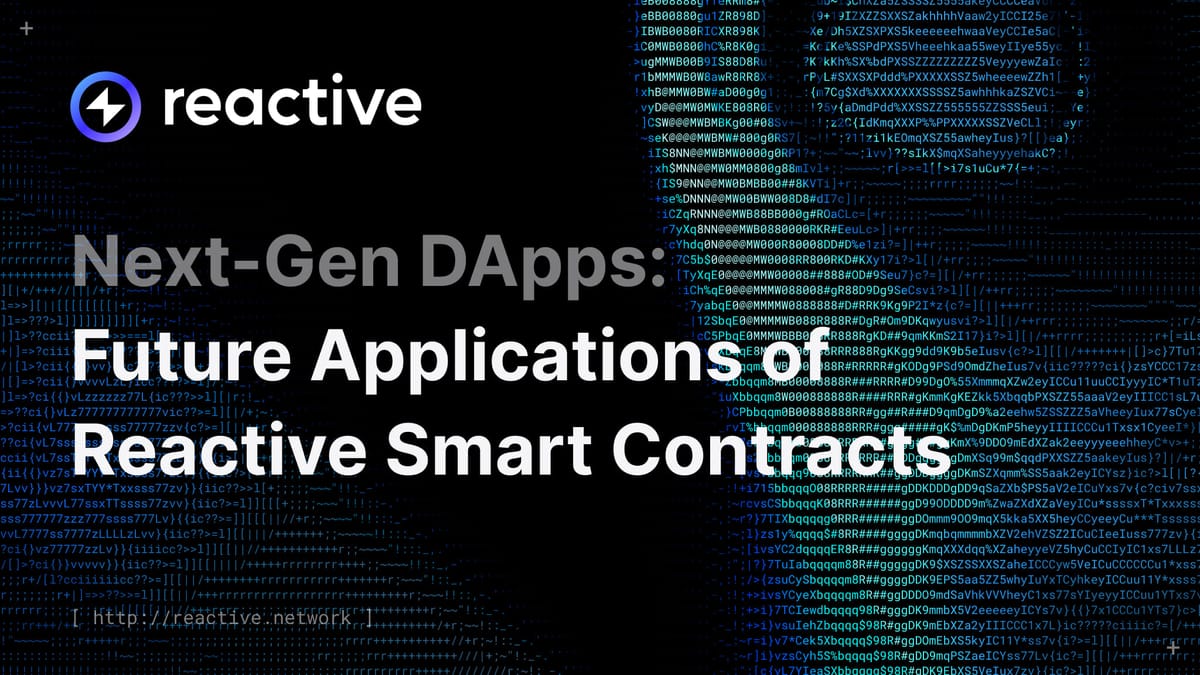Next-Gen Blockchain: Future Applications of Reactive Smart Contracts: Part 3
The third part focuses on three more reactive use cases that resolve the problems of tomorrow: Automated Insurance Payouts, IoT Payouts, and Automated Funds Distribution.

In the first article of our Reactive use case series, we discussed Cross-Chain Oracle, Automated Token Buyback and Burn, and Automated One-Step Swap. In the second article, we considered Automated Governance, Cross-Chain Governance, and Automated Prediction Market. In case you missed them, feel free to review the previous articles for details.
The third part focuses on three more reactive use cases that resolve the problems of tomorrow: Automated Insurance Payouts, IoT Payouts, and Automated Funds Distribution. While these use cases are still in the conceptual stage due to the current lack of practical applications in their fields, they show how Reactive Smart Contracts can improve efficiency, accuracy, and reliability in insurance claims, IoT-based transactions, and fund distribution, addressing current limitations and improving overall system performance.
Automated Funds Distribution
– a multi-party wallet that distributes incoming funds among shareholders proportionally to their shares.
Problem
Automating funds distribution ensures that each shareholder promptly receives their share of incoming funds. This is particularly beneficial for scenarios such as dividend payments, revenue sharing in joint ventures, or profit distribution in DAOs. It eliminates the need for manual calculations and transfers, thereby increasing efficiency and reliability.
Manual distribution of funds is time-consuming and error-prone. It often involves significant administrative overhead and delays, particularly when distributing funds among a large number of shareholders. Moreover, manual processes can result in inaccuracies and disputes over the correct amounts to be distributed.
Reactive Solution
Reactive Smart Contracts (RSCs) can automate the distribution of funds immediately upon their arrival in the wallet. The RSC calculates each shareholder’s share based on predefined proportions and automatically distributes the funds. This process is performed without charging gas fees to the entity sending the funds, making it more cost-effective and efficient.
Automated Insurance Payouts
– automatic payouts for insurance events based on oracle data.
Problem
Manual verification and processing of insurance claims are prone to delays and potential disputes. This can lead to dissatisfaction among policyholders and inefficiencies in the insurance system, as claims may take a long time to be reviewed and approved.
For example, in the event of a natural disaster, affected individuals can often face lengthy verification processes before receiving financial aid.
Reactive Solution
Reactive Smart Contracts (RSCs) can address these issues by automatically verifying insurance events using oracle data and triggering payouts immediately. This automation ensures timely and accurate compensation for insurance claims, reducing waiting time and increasing trust in the insurance process.
By eliminating manual processes, RSCs provide quick financial aid and minimize the potential for disputes, elevating overall user experience and satisfaction with the insurance system.
IoT Payouts
– automatic payouts based on data from IoT sensors.
Problem
Current systems for IoT-based financial transactions rely on manual verification and processing of IoT data, which can be slow and error-prone, thereby undermining their reliability and efficiency.
This delay and potential for inaccuracies highlight the need for improvement. For example, a contract could automatically release payments when the temperature drops below a certain threshold, supporting applications such as automated energy cost adjustments or climate-based insurance.
Reactive Solution
Reactive Smart Contracts (RSCs) can address these issues by directly monitoring IoT oracles to automate payouts based on predefined conditions. This automation ensures that payments are made promptly and accurately whenever the specified conditions are met, without the need for manual intervention. By removing manual procedures, RSCs enable rapid financial transactions and reduce the likelihood of errors, improving how users interact with and feel about IoT-based financial systems.
Conclusion
Reactive Smart Contracts hold the potential to upgrade automated insurance payouts, IoT-triggered transactions, and funds distribution among shareholders. While these ideas are speculative at present due to the early stage of their development, they show how automation can lead to greater efficiency and accuracy in complex financial processes, setting the stage for future applications in DeFi and IoT.
Though these advancements are still on the horizon, it's an exciting vision of what might be possible. If you're eager to implement any of these use cases, we encourage you to join our Hackathon .
About Reactive Network
The Reactive Network, pioneered by PARSIQ, ushers in a new wave of blockchain innovation through its Reactive Smart Contracts (RSCs). These advanced contracts can autonomously execute based on specific on-chain events, eliminating the need for off-chain computation and heralding a seamless cross-chain ecosystem vital for Web3’s growth.
Central to this breakthrough is the Inversion of Control (IoC) framework, which redefines smart contracts and decentralized applications (DApps) by imbuing them with unparalleled autonomy, efficiency, and interactivity. By marrying RSCs with IoC, Reactive Network is setting the stage for a transformative blockchain era, characterized by enhanced interoperability and the robust, user-friendly foundation Web3 demands.





